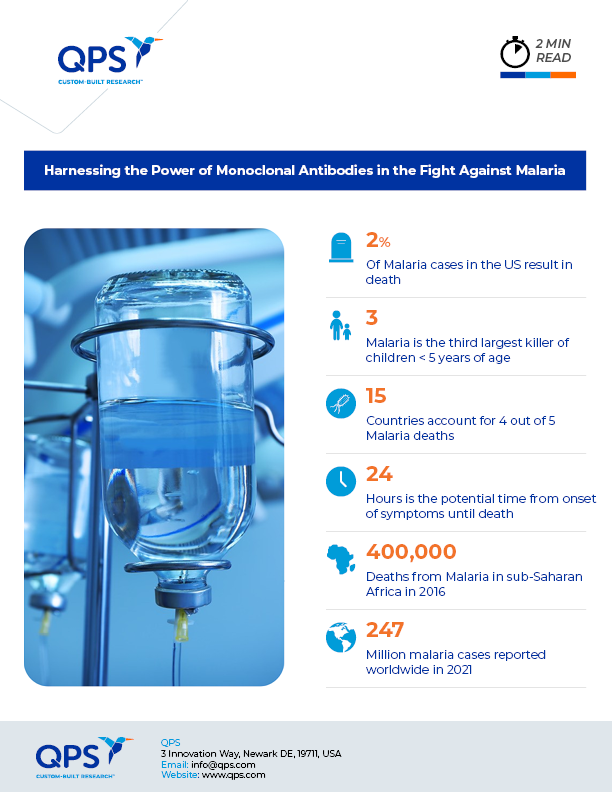Monoclonal antibodies have been deployed to treat a variety of diseases, from cancer to COVID-19. Now this treatment approach, which doesn’t depend on the body’s ability to build immunity like vaccines do, is targeting malaria. In a Phase II clinical trial, a monoclonal antibody known as CIS43LS was found to be 88 percent effective in protecting people from the disease. Researchers are hopeful that it could join other methods to help reduce the disease burden of malaria.
Malaria is a major global public health concern. The World Health Organization (WHO) estimated that 619,000 people worldwide died from the disease in 2021 and that children under age five accounted for more than 80 percent of the malaria deaths in sub-Saharan Africa that year.
First of Its Kind Study
The Phase II clinical trial involved 369 healthy adults aged 18 to 55 years old in the rural communities of Kalifabougou and Torodo, in Mali. Over the course of a six-month intense malaria season, CIS43LS was found to be up to 88 percent effective at preventing infection with Plasmodium falciparum malaria. Peter D. Crompton, Chief of Malaria Infection Biology and Immunology at the US National Institute of Allergy and Infectious Diseases, who co-led the study, said it is the first time research has demonstrated that a monoclonal antibody can prevent malaria in an endemic and real-world setting.
The clinical study also evaluated the safety of CIS43LS. Participants received a single dose of the intravenous infusion, and after 24 weeks, the treatment was found to be “very safe and tolerable,” according to Kassoum Kayentao, an immunologist at the University of Sciences, Techniques and Technologies (USTTB) in Bamako, who led the trials in Mali.
Combining Approaches for a Stronger Defense
The research findings, published in the New England Journal of Medicine, suggest that monoclonal antibody treatment could offer a useful strategy to protect people at high risk for malaria, such as people traveling to malaria-endemic regions, children under age five, and pregnant women.
Monoclonal antibody drugs represent one tool in the fight against malaria and have advantages and disadvantages. Although they have proven useful in treating a variety of other diseases, they are expensive to produce and must be administered in a hospital. This is particularly challenging in rural communities, where malaria is most prevalent.
Further research is needed, but specialists suggest that monoclonal antibody drugs for malaria prevention could someday be combined with other available tools. These include oral antimalarial drugs and insecticide-treated bed nets. The malaria vaccine approved by the World Health Organization, Mosquirix, is also an important milestone but will be most effective in combination with other prevention methods. A monoclonal antibody could someday offer a layer of protection for seasonal workers or others traveling to areas with seasonal outbreaks.
Research Expands the Arsenal
Even as additional experimental vaccines are being evaluated, research is underway to test a second-generation monoclonal antibody. Called L9LS, it is being studied among children and adults in Mali and Kenya. A more potent drug, it would utilize a lower dose, reducing the cost and making administration easier. Furthermore, the Bill and Melinda Gates Medical Research Institute is working to advance a third monoclonal antibody into clinical trials.
Jacqueline Kirchner, Senior Program Officer at the Gates Foundation, promoted the monoclonal antibody approach to malaria prevention, noting that it could offer immediate, months-long protection to vulnerable people. “I’m very optimistic that monoclonal antibodies and other biologics will be democratized and will be made available at a much lower cost than they are right now,” she said. She added that, “These advances help us see, more clearly than ever before, a world where disease and death caused by malaria can be reduced and eradication is possible.”
Did you enjoy this blog post? Check out our other blog posts as well as related topics on our Webinar page.
QPS is a GLP- and GCP-compliant contract research organization (CRO) delivering the highest grade of discovery, preclinical and clinical drug research development services. Since 1995, it has grown from a tiny bioanalysis shop to a full-service CRO with 1,200+ employees in the U.S., Europe and Asia. Today, QPS offers expanded pharmaceutical contract R&D services with special expertise in neuropharmacology, DMPK, toxicology, bioanalysis, translational medicine and clinical development. An award-winning leader focused on bioanalytics and clinical trials, QPS is known for proven quality standards, technical expertise, a flexible approach to research, client satisfaction and turnkey laboratories and facilities. Through continual enhancements in capacities and resources, QPS stands tall in its commitment to delivering superior quality, skilled performance and trusted service to its valued customers. For more information, visit www.qps.com or email [email protected].






